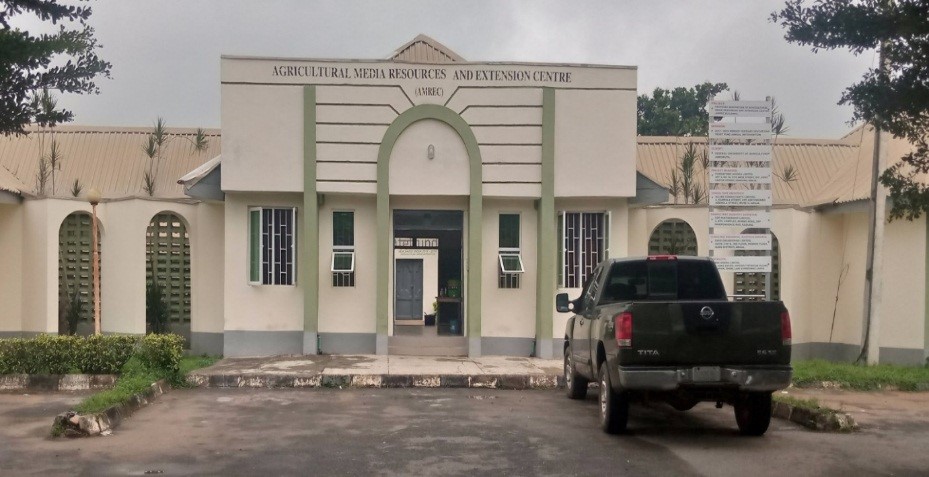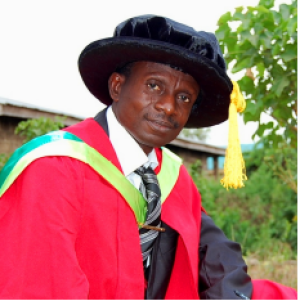Brief History
The Federal University of Agriculture, Abeokuta (FUNAAB), as one of the specialized Universities of Agriculture in Nigeria, had at its inception in January 1988, the tripartite mandates of Teaching/Training (Manpower Development), Research (particularly Problem Directed and Result Oriented Research) and Extension Services (Transfer of Proven Technologies and Community Development). The Agricultural Media Resources and Extension Centre (AMREC) is the leg upon which the extension mandate rests. Agricultural extension services have crucial roles to play in agricultural development employ strategies that involve training, demonstration, adaptive research and communication to help farmers and other stakeholders in agriculture form opinions and adopt new knowledge and technologies that will enhance agricultural productivity and ultimately improve their livelihoods. The University commenced extension and outreach services in 1990 while the AMREC was inaugurated and established in November 1, 1991 and charged with the responsibility of fulfilling the extension mandate of FUNAAB to stakeholders (Extensionists, Farmers, Processors, Industrialists and Marketers among others) across the Southwestern states of Nigeria. AMREC’s approach to extension activities involves the adoption of model extension villages and the use of an Inter-disciplinary Extension System in agricultural technology transfer.
The AMREC has had eleven (11) numbers of Directors since inception, these are as follows:
- Late Prof. I. A. Akinbode (1991-1994),
- Late Prof. S.K.T. Williams (1995-1996),
- Late Prof. P. A. Okuneye (1996-1997),
- Late Dr. I. Idowu (1997-2000),
- Late Prof. Y. A. Adeoti (2000-2005),
- Prof. A. M. Omotayo (2005-2008),
- Prof. F. K. Salako (2008-2011),
- Prof. Carolyn Afolake Afolami (2011-2015),
- Prof. V.I.O. Olowe (2015-2018),
- Prof. Dorcas A. Adegbite (2018-2021) and
- Prof. O. J. Olaoye (Current).
Vision
To be a Centre of Excellence fulfilling the university’s extension mandate towards enhancement of rural families’ livelihood status, optimum youth development and sustainable economic development.
Mission
To increase farmers’, youths’ and farm-families’ socio-economic status by improving their agricultural productivity, self-reliance, sustainability and livelihood through capacity-building, improved technology transfer and information dissemination using different extension methods and media communication.
Functions
The main function of the Agricultural Media Resources and Extension Centre (AMREC) as the extension arm of the University is to fulfil the extension mandate of the University for Sustainable Agricultural Development globally and improvement in farmers’ welfare, productivity and livelihood.
The specific functions are:
- Implementation and coordination of all extension and outreach programmes of the University;
- Harvesting of agricultural challenges and needs for research development;
- Collation of research outputs, innovations and technologies that could alleviate stakeholders’ challenges;
- Mounting On-station and On-farm Adaptive Research and demonstrations on technological outputs and innovations;
- Translation of appropriate agricultural research findings into media materials with main emphasis on video, audio and printed materials;
- Publication of proven technical and extension materials, reports and proceedings emanating from the outputs of researchers and subject matter specialists;
- Dissemination of information on agricultural technologies and innovations that is well adaptable to the ecological zones in Southwest Nigeria;
- Training of extension personnel in the area of advances in agricultural production, extension delivery and media production;
- Provision of specialized training for farmers and agro-processors in the University mandate areas;
- Liaison with radio and television stations to broadcast and telecast improved and problem-solving agricultural technologies to the farmers;
- Provision of communication support facilities for training, research and extension activities;
- Promotion of Optimum development of Youths in and out of schools through the FUNAAB Youth Development (FUNAAB Y-D) initiative, utilizing the 4-H Approach;
- Stimulating the interest of youth in agricultural and agro-processing ventures and encouraging their participation, through capacity-building and empowerment initiatives;
- Promotion and maintenance of farm-family health, through the Farm-Family Health Project (FFAHEP) initiative;
- Developing capacities of farm-families and especially women, in post-harvest technologies (food processing, preservation, utilization, storage and product marketing) as well as Vocational and Entrepreneurial skills for poverty alleviation;
- Empowerment of adult farm-family member learners (males and females) with literacy skills (ability to read, write, calculate and communicate in English language);
- Promotion of linkages between farmers, agro-processors, farm-families and collaborative agencies;
- Provision of technical support, advisory, linkage and input supply services; and
- Collaboration with other research outlets (within and outside the University), Agricultural Development Programmes (ADPs), extension units, agencies, Ministry of Agriculture and other organizations to render agricultural and agro-processing support services.
Organization/Administration
The overall governing body of the Centre is the AMREC Policy Board under the Chairmanship of the Vice-Chancellor. The Board is to ensure that AMREC runs its activities in line with the laid down regulations of the University, relates closely with the various Colleges within the University as well as Research Organizations, Agencies and Institutions in the Country, with a view of jointly proffering lasting solutions to identified farmer-centred problems from time to time.
The Board also ensures that AMREC Management Committee (AMRECMAC) meets regularly to discuss issues relating to the overall development of the Centre and implementation of its mandate for extension services. Members of AMRECMAC under the Chairmanship of the Deputy Vice-Chancellor (Development) comprise the Director of AMREC, Deans of Colleges and other Directors of Academic Units, the Director of IFSERAR, the Head of Department of Agricultural Extension and Rural Development and the representatives of Colleges, resource Persons/Scientists in different areas of Agriculture and related disciplines, and two representatives of the Senate.
AMRECMAC – Terms of Reference
- Execute the overall vision, mission, goals and priorities of the University extension mandate;
- Oversee functions of AMREC and formulate policies for effective functioning and efficiency of the Centre;
- Formulate policies on the establishment of Linkages with Agricultural Research Institutes and other Agricultural Extension Agencies;
- Submit proposals for the establishment of extension villages in all states of the University catchment’s area; and
- Consider any other matter referred to it by the Senate or the Vice-Chancellor.
The major duty of the Director is to administer the Centre. S/he coordinates the different programmes and extension activities made operational through the programmes.
Operating Programmes
The Centre currently has five Operating Programmes coordinated by their respective Programme Leaders or Coordinators.
- Extension and Adaptive Research (EAR);
- Gender Issues and Youth Development (GIYD);
- Media and Farm Broadcast (MFB); Planning,
- Monitoring, Evaluation and ICT (PME-ICT);
- Training and Farm Demonstration (TFD) Programmes.


